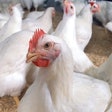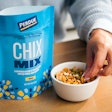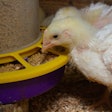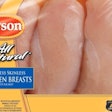
A resounding fear within the agricultural industry for years has been the day when antibiotics are rendered obsolete by continued antimicrobial resistance.
Animal nutritionist Dr. Miriam Alberto-Tempra said as much recently during the Feed Strategy Seminar held during Animal Health & Nutrition Asia in Bangkok.
“If we are using a lot of these [antibiotics] in food animal production … there will come a time when the antibiotics we are using on animals, if they belong to the same class we are using for humans, will not be effective anymore,” she said.
Tempra suggested that, instead of relying much longer on antimicrobial growth promoters (APGs), or the antibiotic treatment that causes “the reduction of competition (by normal intestinal bacteria) with hosts for nutrients and the reduction in number of harmful gut bacteria,” livestock should be treated with a diet that promotes overall gut functionality. If livestock are overtreated with APGs, they won’t be able to properly absorb the nutrients from their feed, regardless of the quality of ingredients or inclusion of beneficial additives. Dr. Miriam Tempra leads a presentation in Bangkok on the merits of animal nutrition and hygiene when reducing APG reliance.Jackie Roembke
Dr. Miriam Tempra leads a presentation in Bangkok on the merits of animal nutrition and hygiene when reducing APG reliance.Jackie Roembke
Additionally, managing stressors that livestock experience also promotes a healthy gut biome that can counteract infestation of bad bacteria in the digestive tract. The gut is important for a variety of reasons, with digestion and absorption of nutrients, microbial balance, and appropriate immune responses being a few vital processes. According to Tempra, poor-quality feed "is just one of the causes of stress for the gut and for the host.” Other stressors that are just as important to consider include the environment, management of the holding pens and pasture, physiological functions, social stress, and overall health.
Breaking the APG cycle
When omitting APGs from livestock care, maintaining a microbial balance in the gut is vital. Tempra described a cycle where the oversupply of nutrients in the gut, which favors some microbes over others, leads to a shift in gut flora, which leads to alterations in the functioning of the gut, and thus to poor digestion of feed nutrients, and so on. Creating a comfortable and healthy living environment for livestock is one way of supplementing the use of APGs.
"We're not just putting one additive after another" in livestock feed, she said. "Think of a holistic view of managing the nutritional portion of our animal production system."
As far as feed that promotes gut health in livestock and enhances animal protein production, Tempra recommended dietary interventions such as highly digestible ingredients, appropriate emulsifiers, fatty acids, organic acids, fiber, enzymes and proper textures for the functionality of gizzards in the case of poultry. Additionally, taking advantage of other elements of feed production (minerals, yeasts, marine extracts, and pre-/pro-/postbiotics, to name a few) may be crucial when considering phasing out APGs.
"With increasing demand for food and feed production, of course, we should not be heavily relying on the use of antibiotics," Tempra said. "APGs have become a way of life for humans and animals. It's important to keep the functionality of the gut antibiotic free and set a new paradigm in animal production business."
For instance, phytogenics, also known as phytogenic feed additives (PFAs) are “plant-originated substances which improve animal performance. ... There are a lot of options,” Tempra said.
Essential oils, herbs and spices are among the additives that contribute PFAs in feed. Phytogenics are one feed additive that can aid in gut health. Tempra also mentioned butyric acids, which reduce inflammation and increase integrity of the gut biome. This makes it another contender for using feed to supplement APG practices.
A reliance on antimicrobials and antibiotics to increase our efficiency in animal protein production is not an infinite solution for livestock health, but with nutritional technology advancing, and more vigorous attention to animal stressors on the part of producers, the feed industry may have an expanding market in the use of nutrients for digestive health. The demand for animal protein products is increasing with the global population, and with the impending failure of APGs to protect productivity, the feed industry may expect a to find itself in a supplemental position.
Editor's note: The 2024 edition of Health & Nutrition Asia was co-located with VICTAM Asia in Bangkok on March 12-14.


















